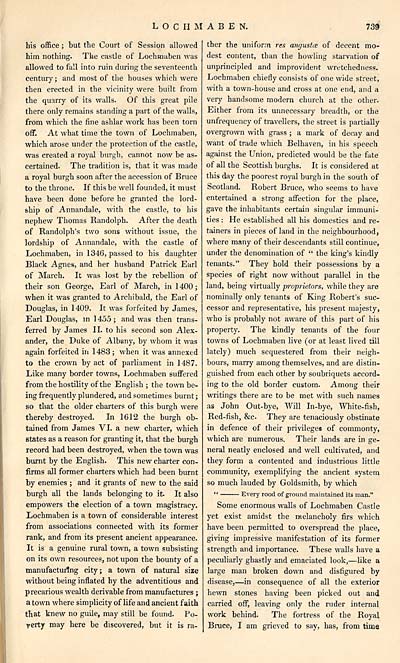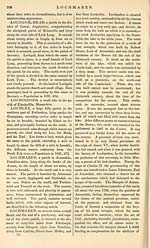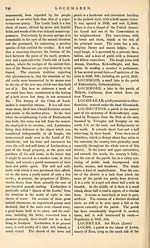Gazetteer of Scotland > Volume 2
(255) Page 739
Download files
Complete book:
Individual page:
Thumbnail gallery: Grid view | List view

LOCHMABE N.
739
his office ; but the Court of Session allowed
him nothing. The castle of Lochmaben was
allowed to fall into ruin during the seventeenth
century ; and most of the houses which were
then erected in the vicinity were built from
the quarry of its walls. Of this great pile
there only remains standing a part of the walls,
from which the fine ashlar work has been torn
off. At what time the town of Lochmaben,
which arose under the protection of the castle,
was created a royal burgh, cannot now be as-
certained. The tradition is, that it was made
a royal burgh soon after the accession of Bruce
to the throne. If this be well founded, it must
have been done before he granted the lord-
ship of Annandale, with the castle, to his
nephew Thomas Randolph. After the death
of Randolph's two sons without issue, the
lordship of Annandale, with the castle of
Lochmaben, in 1346, passed to his daughter
Black Agnes, and her husband Patrick Earl
of March. It was lost by the rebellion of
their son George, Earl of March, in 1400;
when it was granted to Archibald, the Earl of
Douglas, in 1409. It was forfeited by James,
Earl Douglas, in 1 455 ; and was then trans-
ferred by James II. to his second son Alex-
ander, the Duke of Albany, by whom it was
again forfeited in 1483 ; when it was annexed
to the crown by act of parliament in 1487.
Like many border towns, Lochmaben suffered
from the hostility of the English ; the town be-
ing frequently plundered, and sometimes burnt;
so that the older charters of this burgh were
thereby destroyed. In 1612 the burgh ob-
tained from James VI. a new charter, which
states as a reason for granting it, that the burgh
record had been destroyed, when the town was
burnt by the English. This new charter con-
firms all former charters which had been burnt
by enemies ; and it grants of new to the said
burgh all the lands belonging to it It also
empowers the election of a town magistracy.
Lochmaben is a town of considerable interest
from associations connected with its former
rank, and from its present ancient appearance.
It is a genuine rural town, a town subsisting
on its own resources, not upon the bounty of a
manufacturing city; a town of natural size
without being inflated hy the adventitious and
precarious wealth derivable from manufactures ;
a town where simplicity of life and ancient faith
that knew no guile, may still be found. Po-
verty may here be discovered, but it is ra-
ther the uniform res angustce of decent mo-
dest content, than the howling starvation of
unprincipled and improvident wretchedness.
Lochmaben chiefly consists of one wide street,
with a town-house and cross at one end, and a
very handsome modern church at the other.
Either from its unnecessary breadth, or the
unfrequency of travellers, the street is partially
overgrown with grass ; a mark of decay and
want of trade which Belhaven, in his speech
against the Union, predicted would be the fate
of all the Scottish burghs. It is considered at
this day the poorest royal burgh in the south of
Scotland. Robert Bruce, who seems to have
entertained a strong affection for the place,
gave the inhabitants certain singular immuni-
ties : He established all his domestics and re-
tainers in pieces of land in the neighbourhood,
where many of their descendants still continue,
under the denomination of " the king's kindly
tenants." They hold their possessions by a
species of right now without parallel in the
land, being virtually proprietors, while they are
nominally only tenants of King Robert's suc-
cessor and representative, his present majesty,
who is probably not aware of this part of his
property. The kindly tenants of the four
towns of Lochmaben live (or at least lived till
lately) much sequestered from their neigh-
bours, marry among themselves, and are distin-
guished from each other by soubriquets accord-
ing to the old border custom. Among their
writings there are to be met with such names
as John Out-bye, Will In-bye, White-fish,
Red-fish, &c. They are tenaciously obstinate
in defence of their privileges of commonty,
which are numerous. Their lands are in ge-
neral neatly enclosed and well cultivated, and
they form a contented and industrious little
community, exemplifying the ancient system
so much lauded by Goldsmith, by which
" Every rood of ground maintained its man."
Some enormous walls of Lochmaben Castle
yet exist amidst the melancholy firs which
have been permitted to overspread the place,
giving impressive manifestation of its former
strength and importance. These walls have a
peculiarly ghastly and emaciated look, — like a
large man broken down and disfigured by
disease, — in consequence of all the exterior
hewn stones having been picked out and
carried off, leaving only the ruder internal
work behind. The fortress of the Royal
Bruce, I am grieved to say, has, from time
739
his office ; but the Court of Session allowed
him nothing. The castle of Lochmaben was
allowed to fall into ruin during the seventeenth
century ; and most of the houses which were
then erected in the vicinity were built from
the quarry of its walls. Of this great pile
there only remains standing a part of the walls,
from which the fine ashlar work has been torn
off. At what time the town of Lochmaben,
which arose under the protection of the castle,
was created a royal burgh, cannot now be as-
certained. The tradition is, that it was made
a royal burgh soon after the accession of Bruce
to the throne. If this be well founded, it must
have been done before he granted the lord-
ship of Annandale, with the castle, to his
nephew Thomas Randolph. After the death
of Randolph's two sons without issue, the
lordship of Annandale, with the castle of
Lochmaben, in 1346, passed to his daughter
Black Agnes, and her husband Patrick Earl
of March. It was lost by the rebellion of
their son George, Earl of March, in 1400;
when it was granted to Archibald, the Earl of
Douglas, in 1409. It was forfeited by James,
Earl Douglas, in 1 455 ; and was then trans-
ferred by James II. to his second son Alex-
ander, the Duke of Albany, by whom it was
again forfeited in 1483 ; when it was annexed
to the crown by act of parliament in 1487.
Like many border towns, Lochmaben suffered
from the hostility of the English ; the town be-
ing frequently plundered, and sometimes burnt;
so that the older charters of this burgh were
thereby destroyed. In 1612 the burgh ob-
tained from James VI. a new charter, which
states as a reason for granting it, that the burgh
record had been destroyed, when the town was
burnt by the English. This new charter con-
firms all former charters which had been burnt
by enemies ; and it grants of new to the said
burgh all the lands belonging to it It also
empowers the election of a town magistracy.
Lochmaben is a town of considerable interest
from associations connected with its former
rank, and from its present ancient appearance.
It is a genuine rural town, a town subsisting
on its own resources, not upon the bounty of a
manufacturing city; a town of natural size
without being inflated hy the adventitious and
precarious wealth derivable from manufactures ;
a town where simplicity of life and ancient faith
that knew no guile, may still be found. Po-
verty may here be discovered, but it is ra-
ther the uniform res angustce of decent mo-
dest content, than the howling starvation of
unprincipled and improvident wretchedness.
Lochmaben chiefly consists of one wide street,
with a town-house and cross at one end, and a
very handsome modern church at the other.
Either from its unnecessary breadth, or the
unfrequency of travellers, the street is partially
overgrown with grass ; a mark of decay and
want of trade which Belhaven, in his speech
against the Union, predicted would be the fate
of all the Scottish burghs. It is considered at
this day the poorest royal burgh in the south of
Scotland. Robert Bruce, who seems to have
entertained a strong affection for the place,
gave the inhabitants certain singular immuni-
ties : He established all his domestics and re-
tainers in pieces of land in the neighbourhood,
where many of their descendants still continue,
under the denomination of " the king's kindly
tenants." They hold their possessions by a
species of right now without parallel in the
land, being virtually proprietors, while they are
nominally only tenants of King Robert's suc-
cessor and representative, his present majesty,
who is probably not aware of this part of his
property. The kindly tenants of the four
towns of Lochmaben live (or at least lived till
lately) much sequestered from their neigh-
bours, marry among themselves, and are distin-
guished from each other by soubriquets accord-
ing to the old border custom. Among their
writings there are to be met with such names
as John Out-bye, Will In-bye, White-fish,
Red-fish, &c. They are tenaciously obstinate
in defence of their privileges of commonty,
which are numerous. Their lands are in ge-
neral neatly enclosed and well cultivated, and
they form a contented and industrious little
community, exemplifying the ancient system
so much lauded by Goldsmith, by which
" Every rood of ground maintained its man."
Some enormous walls of Lochmaben Castle
yet exist amidst the melancholy firs which
have been permitted to overspread the place,
giving impressive manifestation of its former
strength and importance. These walls have a
peculiarly ghastly and emaciated look, — like a
large man broken down and disfigured by
disease, — in consequence of all the exterior
hewn stones having been picked out and
carried off, leaving only the ruder internal
work behind. The fortress of the Royal
Bruce, I am grieved to say, has, from time
Set display mode to: Large image | Transcription
Images and transcriptions on this page, including medium image downloads, may be used under the Creative Commons Attribution 4.0 International Licence unless otherwise stated. ![]()
| Gazetteers of Scotland, 1803-1901 > Gazetteer of Scotland > Volume 2 > (255) Page 739 |
|---|
| Permanent URL | https://digital.nls.uk/97433882 |
|---|
| Description | Volume II: Glenbanchor to Zetland. |
|---|---|
| Attribution and copyright: |
|
| Description | By Robert Chambers and William Chambers. Glasgow: Blackie & Son, 1838. 2 volumes. |
|---|---|
| Shelfmark | NF.1461.g.7 |
| Additional NLS resources: | |

